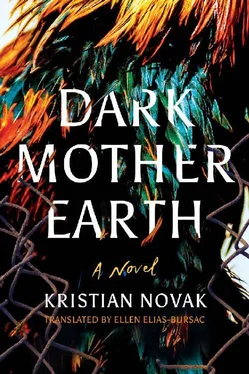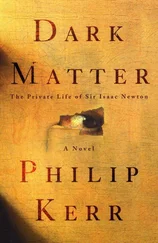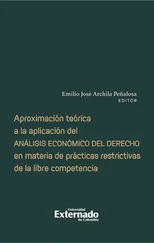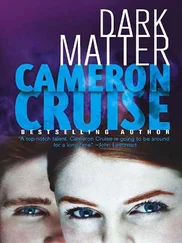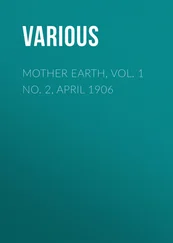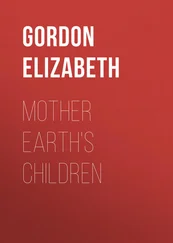Since they hadn’t been able to find Imbra, the council wound up asking Čanadi to do the lighting for the village games. When they asked how much he’d charge, he said, “What do you mean? A portion of bograč game stew and a wine spritzer,” so everybody had been calling Čanadi Mr. Decent, and Imbra Mr. Collector.
The village games were oddly conceived. They weren’t held on the first of May, nor were they the finale of the soccer season. Instead they were held midweek, I think on a Tuesday or a Wednesday. People said it was to celebrate the declaration of Croatian independence, but that was a pretty shaky pretext. Beyond the village there were tectonic plates shifting, Earth’s pillars were rocking, but here we felt as if the last supports had long since fallen, and only by pure chance was the village still afloat.
Some fifteen mothers had left the village with their children, some to stay with relatives in nearby towns, others to Austria and Germany. Some of the wealthier retirees supposedly went off to a hot springs near Varaždin. The rest lived as best they could from one day to the next, relieved that the village wasn’t being mentioned in the news anymore. That would have been a real disgrace. As if it weren’t enough that folks from the neighboring villages used every opportunity to mock them. Not many people talked about Mario Brezovec and Zdravko Tenodi, but Trezika came up when one of the older women started acting strangely, and hardly anybody but me and his family remembered Mladen Krajčić. There was talk about Milica, who’d died the week before, but somebody said she had always been high-strung and that she’d stopped socializing after she had her baby, and maybe she’d started drinking too much when Mladen wasn’t home, and he had barely been able to handle her.
I didn’t feel like going to the village games, but Franz was finding it harder to bear the isolation. He was out on the street whenever possible, as if he couldn’t stand to listen to the hypnotic rhythm of his own breath. After Milica’s funeral, no one forced Franz to account for the supposed theft of the goalie’s gloves, and I hoped that story would just fade away and he wouldn’t have to go help Mladen around the house. If that bad thing happened only once, I hoped that maybe Franz could get past it. One day on our way to the soccer field, I told him about satellite antennas and how you could watch any TV show you liked; there were whole channels just for cartoons, and phones you could carry around with you that weren’t attached to the wall. He stared at me, incredulous, the same way he looked at me when I told him how I was really feeling. About Laddie and my dad, Bacawk and Chickichee, and everybody who was waiting for me in hell. I needed to tell him everything that day, and we needed to take an oath of eternal silence and friendship. When we reached the field, I immediately spotted Goran Brezovec, Dejan Kunčec, and a few other boys wearing the new green soccer jerseys of the Miners soccer team. Their last names were on the backs.
“Well, well, lookee here, if it ain’t Tom and Jerry,” said one of them, catching sight of us.
“Fuck you,” I yelled, and added, “Fuck all of you.”
Never had that swear sounded quite as pitiful. I walked with big-headed Franz, who was still spitting around the bulky, bluish tongue inside his mouth. I would have given my eyeteeth to be wearing a green jersey with Dolenčec on the back. But the swear was meant to sound as if I was downright disinterested.
Everybody had gathered at the soccer field, even people from outlying villages. The hill people who lived above the vineyards at the edge of the forest, and who were quite strange, had also come down. Most hadn’t had any schooling; they kept to themselves, lived off the land and the wine, died young, and seldom came into the village. There was talk that some of them had no idea about the Second World War because it had nothing to do with them. The men and women looked a lot alike, they dressed as if they hadn’t been to Čakovec in twenty years, and now they swilled vast quantities of alcohol and laughed only when the hose burst during the firefighters’ exercise and soaked the grass on the soccer field, or when somebody fell.
Everybody else perched on the embankment along the fence, going from the bar to the stands selling plastic toys, bouncy balls, and Croatian flags, then leaning against the soccer field fence, cold beer in hand, and listening to those speaking loudest about the Yugoslav People’s Army barracks and the weapons that really ought to be retrieved from them. It all sounded as if this was happening somewhere far away, as if nothing would be encroaching on our village of hells. At first the hells knocked politely at the door, waiting patiently, as they’d waited in the gloom of people’s farmyards. After that they pushed their way in, through cruelty and bickering. And now people, stripped of resistance, were just letting them into their homes. They opened the door for the hells without even waiting for a knock, let them in, and took them along wherever they went.
From time to time, people wandered over to watch a bizarre play starring Nevenka Brezovec, a high school student, Goran’s older sister. She always got the lead in all the school performances because she was pretty and read with emotion, and her aunt worked on Radio Čakovec.
After the local firefighters showed they could handle any fire, the young soccer players filed in wearing their new jerseys given by the village and kicked balls around. Bogdan was behind the bar, and he didn’t hear when they called his name to acknowledge him as coach. He was standing in for Mladen, the regular barman, who was home mourning his wife. After that the boys played two skirmishes for fifteen minutes each. After the first halftime, they were all so smeared with the mud left behind by the firefighters that nobody could tell who was on which side. The soccer team played tug-of-war against the village hunters’ association, which would have escalated into a drunken brawl if Đura Brezovec, village head, hadn’t announced that we should celebrate the independence of our beautiful homeland with dignity (at which point somebody in the crowd heckled that he should’ve said “undependence”). Then the national anthem was sung. The hill people stayed sitting but clapped at the end. There was a suckling pig turning on a spit and black mead being served. Black mead was so sweet that people gave it to kids, even though it was alcoholic. Bograč game stew was cooking, and everything smelled like a wedding.
Next on the program was Robi Šmujd, a sixth grader who played “Bridge Over Troubled Water” on a synthesizer over a programmed rhythm track, and then he accompanied the ladies’ church choir for “The Strapping Boys of Međimurje.” They called him the Mozart of Međimurje because by the age of four he could play “Frère Jacques” on a melodeon, and his photograph had appeared in Međimurje , the local paper.
After that, twins who were part of a dance group in Mursko Središće danced to “Bad” by Michael Jackson, blasting it from a transistor radio. The elementary school drama club performed, in Međimurje folk dress, a selection of Marica Hrdalo gags from the sketch show Gruntovčani , though people were so sick of those by then that they couldn’t bear to watch them anymore. After all the performances, Nevenka reminded everybody of the bograč, the tombola raffle, and Jula Mlinarić’s stand. Jula was a widow who’d been asked to cook for the games, because she’d won second place the year before in a Čakovec baking contest. Her vanilla half-moons and Russian-hat cakes had beaten the creations of seventeen women from other villages, all except one from Šenkovec, but word had it that the woman who took the first prize was, in fact, a professional chef. Jula was given a stand, and I watched her during the performances as she earnestly served homemade mead, duck pâté, fried crepes with mushrooms, boiled corn, and bishop’s bread. However, quite by coincidence, for some twenty minutes nobody had eaten anything at her stand. People would stop and chat with the dear woman who offered them food, but they would refuse. Some would say they’d be back in a bit, some that they couldn’t possibly eat anything because they were still full from dinner. Some fifty feet away there was bograč stewing, and when she could see people eating it on plastic plates with slices of white bread from the supermarket, she couldn’t hide her disappointment. She put on a brave face, saying hello, showing folks how delicious her dishes were by taking bites herself and washing them down with the mead. I watched all this while Franz was watching the game, and I felt I had to buy something from her. I was moving toward her when she suddenly froze, looked up at the sky, bent over, and vomited copiously onto the path. In one hand she was still holding a half-eaten piece of fried chicken, as if she intended to finish it.
Читать дальше
